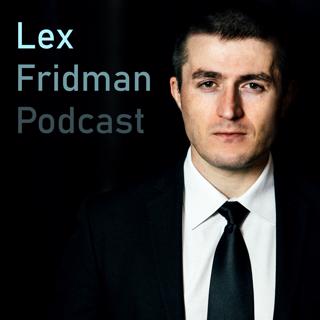
#119 – David Eagleman: Neuroplasticity and the Livewired Brain
David Eagleman is a neuroscientist at Stanford. Support this podcast by supporting our sponsors: - Athletic Greens: https://athleticgreens.com/lex - BetterHelp: https://betterhelp.com/lex – Cash App: download app & use code "LexPodcast" Episode links: David's Website: https://www.eagleman.com/ David's Twitter: https://twitter.com/davideagleman Livewired (book): https://amzn.to/3ba4ezv If you would like to get more information about this podcast go to https://lexfridman.com/podcast or connect with @lexfridman on Twitter, LinkedIn, Facebook, Medium, or YouTube where you can watch the video versions of these conversations. If you enjoy the podcast, please rate it 5 stars on Apple Podcasts, follow on Spotify, or support it on Patreon. Here's the outline of the episode. On some podcast players you should be able to click the timestamp to jump to that time. OUTLINE: 00:00 - Introduction 05:05 - Livewired 16:39 - Hardware vs software 25:53 - Brain-computer interfaces 35:12 - 2020 is a challenge for neuroplasticity 46:08 - Free will 50:43 - Nature of evil 58:55 - Psychiatry 1:06:28 - GPT-3 1:13:31 - Intelligence in the brain 1:21:51 - Neosensory 1:31:27 - Book recommendations 1:34:07 - Meaning of life 1:36:53 - Advice for young people
26 Elo 20201h 41min

New Name: Lex Fridman Podcast
New podcast name. New Russian hitman thumbnail. Everything else stays the same. AI is still my passion, but this gives me a bit more freedom to talk to interesting folks from all over. Thanks for the support & the love. If you would like to get more information about this podcast go to https://lexfridman.com/podcast or connect with @lexfridman on Twitter, LinkedIn, Facebook, Medium, or YouTube where you can watch the video versions of these conversations. If you enjoy the podcast, please rate it 5 stars on Apple Podcasts, follow on Spotify, or support it on Patreon.
24 Elo 20202min

#118 – Grant Sanderson: Math, Manim, Neural Networks & Teaching with 3Blue1Brown
Grant Sanderson is a math educator and creator of 3Blue1Brown. Support this podcast by supporting our sponsors: - Dollar Shave Club: https://dollarshaveclub.com/lex - DoorDash: download app & use code LEX - Cash App: download app & use code "LexPodcast" Episode links: 3Blue1Brown: http://youtube.com/3blue1brown Grant's Twitter: https://twitter.com/3blue1brown If you would like to get more information about this podcast go to https://lexfridman.com/podcast or connect with @lexfridman on Twitter, LinkedIn, Facebook, Medium, or YouTube where you can watch the video versions of these conversations. If you enjoy the podcast, please rate it 5 stars on Apple Podcasts, follow on Spotify, or support it on Patreon. Here's the outline of the episode. On some podcast players you should be able to click the timestamp to jump to that time. OUTLINE: 00:00 - Introduction 05:13 - Richard Feynman 09:41 - Learning deeply vs broadly 13:56 - Telling a story with visualizations 18:43 - Topology 23:52 - Intuition about exponential growth 32:28 - Elon Musk's exponential view of the world 40:09 - SpaceX and space exploration 45:28 - Origins of the Internet 49:50 - Does teaching on YouTube get lonely? 54:31 - Daily routine 1:00:20 - Social media 1:10:38 - Online education in a time of COVID 1:27:03 - Joe Rogan moving to Spotify 1:32:09 - Neural networks 1:38:30 - GPT-3 1:46:52 - Manim 1:51:01 - Python 1:56:21 - Theory of everything 2:03:53 - Meaning of life
23 Elo 20202h 8min

#117 – Sheldon Solomon: Death and Meaning
Sheldon Solomon is a social psychologist, a philosopher, co-developer of Terror Management Theory, co-author of The Worm at the Core. Please support this channel by supporting our sponsors: - Blinkist: https://blinkist.com/lex – ExpressVPN at https://www.expressvpn.com/lexpod – Cash App: download app & use code "LexPodcast" Episode links: Sheldon's Website: https://www.skidmore.edu/psychology/faculty/solomon.php The Worm at the Core (book): https://amzn.to/31hQAXH Denial of Death (book): https://amzn.to/329Zxl4 If you would like to get more information about this podcast go to https://lexfridman.com/podcast or connect with @lexfridman on Twitter, LinkedIn, Facebook, Medium, or YouTube where you can watch the video versions of these conversations. If you enjoy the podcast, please rate it 5 stars on Apple Podcasts, follow on Spotify, or support it on Patreon. Here's the outline of the episode. On some podcast players you should be able to click the timestamp to jump to that time. OUTLINE: 00:00 - Introduction 05:34 - Role of death in life 22:57 - Jordan Peterson 53:02 - Humans are both selfish and cooperative 56:57 - Civilization collapse 1:10:07 - Meditating on your mortality 1:16:10 - Kierkegaard and Heidegger 1:33:25 - Elon Musk 1:36:56 - Thinking deeply about death 1:45:53 - Religion 1:56:59 - Consciousness 2:03:39 - Why is Ernest Becker not better known 2:07:09 - AI and mortality 2:21:07 - Academia should welcome renegade thinkers 2:36:33 - Book recommendations 2:43:23 - Advice for young people 2:48:17 - Meaning of life
20 Elo 20202h 56min

#116 – Sara Seager: Search for Planets and Life Outside Our Solar System
Sara Seager is a planetary scientist at MIT, known for her work on the search for exoplanets. Support this podcast by supporting our sponsors. Click links, get discount: - Public Goods at https://publicgoods.com/lex and use code LEX - PowerDot: https://powerdot.com/lex and use code LEX – Cash App – use code "LexPodcast" and download: – Cash App (App Store): https://apple.co/2sPrUHe – Cash App (Google Play): https://bit.ly/2MlvP5w Episode links: Sara's Twitter: https://twitter.com/profsaraseager Sara's Website: https://www.saraseager.com/ The Smallest Lights in the Universe (book): https://amzn.to/3g3LfHA If you would like to get more information about this podcast go to https://lexfridman.com/ai or connect with @lexfridman on Twitter, LinkedIn, Facebook, Medium, or YouTube where you can watch the video versions of these conversations. If you enjoy the podcast, please rate it 5 stars on Apple Podcasts, follow on Spotify, or support it on Patreon. Here's the outline of the episode. On some podcast players you should be able to click the timestamp to jump to that time. OUTLINE: 00:00 - Introduction 05:32 - Falling in love with the stars 09:55 - Are we alone in the universe? 15:27 - Seager equation for number of habitable planets 27:48 - Exoplanets 34:44 - Earth-like exoplanets 40:43 - Intelligent life 52:34 - Number of planets per star 55:09 - Space exploration 57:36 - Traveling to Proxima Centauri 1:00:52 - Starshade 1:07:34 - Using the sun as a gravitational lens 1:09:44 - Starshot 1:12:45 - Rogue planets 1:15:44 - The Smallest Lights in the Universe 1:30:15 - Book recommendations 1:37:48 - Advice for a young person 1:39:29 - Meaning of life
16 Elo 20201h 42min

#115 – Dileep George: Brain-Inspired AI
Dileep George is a researcher at the intersection of neuroscience and artificial intelligence, co-founder of Vicarious, formerly co-founder of Numenta. From the early work on Hierarchical temporal memory to Recursive Cortical Networks to today, Dileep's always sought to engineer intelligence that is closely inspired by the human brain. Support this channel by supporting our sponsors. Click links, get discount: - Babbel: https://babbel.com and use code LEX - MasterClass: https://masterclass.com/lex - Raycon: https://buyraycon.com/lex If you would like to get more information about this podcast go to https://lexfridman.com/ai or connect with @lexfridman on Twitter, LinkedIn, Facebook, Medium, or YouTube where you can watch the video versions of these conversations. If you enjoy the podcast, please rate it 5 stars on Apple Podcasts, follow on Spotify, or support it on Patreon. Here's the outline of the episode. On some podcast players you should be able to click the timestamp to jump to that time. OUTLINE: 0:00 - Introduction 4:50 - Building a model of the brain 17:11 - Visual cortex 27:50 - Probabilistic graphical models 31:35 - Encoding information in the brain 36:56 - Recursive Cortical Network 51:09 - Solving CAPTCHAs algorithmically 1:06:48 - Hype around brain-inspired AI 1:18:21 - How does the brain learn? 1:21:32 - Perception and cognition 1:25:43 - Open problems in brain-inspired AI 1:30:33 - GPT-3 1:40:41 - Memory 1:45:08 - Neuralink 1:51:32 - Consciousness 1:57:59 - Book recommendations 2:06:49 - Meaning of life
14 Elo 20202h 10min

#114 – Russ Tedrake: Underactuated Robotics, Control, Dynamics and Touch
Russ Tedrake is a roboticist and professor at MIT and vice president of robotics research at TRI. He works on control of robots in interesting, complicated, underactuated, stochastic, difficult to model situations. Support this podcast by supporting our sponsors. Click links, get discount: - Magic Spoon: https://magicspoon.com/lex & use code LEX at checkout - BetterHelp: https://betterhelp.com/lex - ExpressVPN: https://www.expressvpn.com/lexpod If you would like to get more information about this podcast go to https://lexfridman.com/ai or connect with @lexfridman on Twitter, LinkedIn, Facebook, Medium, or YouTube where you can watch the video versions of these conversations. If you enjoy the podcast, please rate it 5 stars on Apple Podcasts, follow on Spotify, or support it on Patreon. Here's the outline of the episode. On some podcast players you should be able to click the timestamp to jump to that time. OUTLINE: 00:00 - Introduction 04:29 - Passive dynamic walking 09:40 - Animal movement 13:34 - Control vs Dynamics 15:49 - Bipedal walking 20:56 - Running barefoot 33:01 - Think rigorously with machine learning 44:05 - DARPA Robotics Challenge 1:07:14 - When will a robot become UFC champion 1:18:32 - Black Mirror Robot Dog 1:34:01 - Robot control 1:47:00 - Simulating robots 2:00:33 - Home robotics 2:03:40 - Soft robotics 2:07:25 - Underactuated robotics 2:20:42 - Touch 2:28:55 - Book recommendations 2:40:08 - Advice to young people 2:44:20 - Meaning of life
9 Elo 20202h 49min

#113 – Manolis Kellis: Human Genome and Evolutionary Dynamics
Manolis Kellis is a professor at MIT and head of the MIT Computational Biology Group. He is interested in understanding the human genome from a computational, evolutionary, biological, and other cross-disciplinary perspectives. Support this podcast by supporting our sponsors: - Blinkist: https://blinkist.com/lex - Eight Sleep: https://eightsleep.com/lex - MasterClass: https://masterclass.com/lex If you would like to get more information about this podcast go to https://lexfridman.com/ai or connect with @lexfridman on Twitter, LinkedIn, Facebook, Medium, or YouTube where you can watch the video versions of these conversations. If you enjoy the podcast, please rate it 5 stars on Apple Podcasts, follow on Spotify, or support it on Patreon. Here's the outline of the episode. On some podcast players you should be able to click the timestamp to jump to that time. OUTLINE: 00:00 - Introduction 03:54 - Human genome 17:47 - Sources of knowledge 29:15 - Free will 33:26 - Simulation 35:17 - Biological and computing 50:10 - Genome-wide evolutionary signatures 56:54 - Evolution of COVID-19 1:02:59 - Are viruses intelligent? 1:12:08 - Humans vs viruses 1:19:39 - Engineered pandemics 1:23:23 - Immune system 1:33:22 - Placebo effect 1:35:39 - Human genome source code 1:44:40 - Mutation 1:51:46 - Deep learning 1:58:08 - Neuralink 2:07:07 - Language 2:15:19 - Meaning of life
31 Heinä 20202h 29min





















